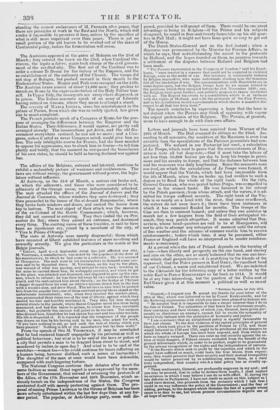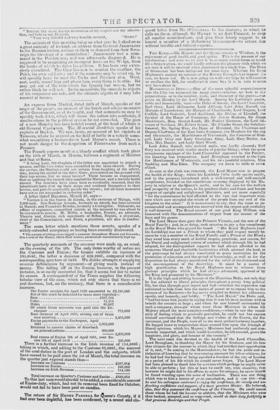Letters and journals have been received from Warsaw of the
28th of March. The Diet resumed its sittings on the 22nd. According to all accounts, the condition of the Russians is even less enviable than the speculations of the Parisian journalists had conjectured. We noticed in our Postsctipt last week, a calculation of Le Temps, which went to prove that the circumstances of DIEBITSCH were all but desperate,—that it must take the labour of not less than 50,000 horses per day to keep his troops in provisions and his cavalry in forage, and that the distance between him and his resources was daily lengthening. Since the accounts were received, on which the calculations of Le Temps were formed, it would appear that the Vistula, which had been impassable from the 5th of March, when the ice broke up, had swollen to such a degree as to flood the whole of the right bank. On the 16th, General GEISMAR, who was posted before Praga, was compelled to retreat in the utmost haste. He was harassed in his retreat by the Polish garrison ; from whose attack, and the waters, it is admitted his troops suffered severely. The right bank of the Vistula is so nearly on a level with the river, that once overflowed, the waters do not soon leave it ; there have been instances in which it has remained flooded for months. The troops of the Czar are then in eminent hazard; and unless they can contrive to march not a few leagues from the field of their anticipated triumph, they may perish altogether. It seems admitted that DIEBITSCEI, whose head-quarters are said to be at Macejowice, will not be able to attempt any enterprise of moment until the return of fine weather and the advance of summer enable him to receive reinforcements ; before which time, it may be presumed, either France or England will have so interposed as to render reinforcements unnecessary.
At a period when the fate of Poland depends on the turning of
lair—when liberty and prosperity on the one hand, and slavery and ruin on the other, are so nicely balanced that no one can foresee which shall preponderate—it is gratifying to the friends of the oppressed, that the Poles possess in Earl GREY, the excellent head of our Cabinet, a warm and enlightened friend. We are indebted to the Chronicle for the following copy of a letter written by the noble Earl to Prince KosciuszKo so far back as 1814. It would be at any time interesting, but the position of the Poles and of Earl GREY gives it at this moment a political as well as moral
value.
"Portman Square, 1st July 1914.
" General,—I request you to accept my thanks for your letter ot' the 20th of May, which was delivered to me by Count Krukowiecki, and for the flattering expressions with which you have been pleased to honour me. " Be assured that it is impossible to take a deeper interest than I do in the fate of Poland. Toe calamities of that brave but unfortunate people, their constancy and their virtues, of which you, General, have given personally so illustrious an examp'e, cannot fail to excite the sympathy of hearts truly imbued with the principles of humanity and justice.
" I am convinced that an enlightened policy is equally favourable to their just claims. To the first violation of the sacred principles of general liberty, which took place in the partition of Poland in 1772, and those which followed in 1793 and 1795, ought to be attributed all the dangers to which the whole of Europe has since been exposed, and from which we have so happily escaped. There can exist no real security against the return of these dangers, if Poland remain excluded from the benefit of the general deliverance which, in order to be perfect, ought to be guaranteed by the solemn recognition of the rights and the independence of nations. If the Powers which seek to profit by the injustice, and which in the sequel have suffered so much, could learn the true lesson from experience, they would perceive that their security and their mutual tranquillity would be better preserved by re-establishing among them, as a state truly independent, that country which a false policy has so cruelly oppressed.
"These sentiments, General, are profoundly engraven in my soul; and you may be assured, that in order to declare them loudly, I shall neglect no occasion in which I may believe I can do so with effect. If, during the late debates in Parliament, I have not dwelt so much on this subject as I could have desired, this proceeds from the certainty which I had that I could in no way influence the policy of the Government ; and the fear of adding, perhaps, to the dangers which threaten the fate of a people whose cause is so dear to me, but whom present circumstances deprive me of all hope of serving.
" Receive the must sincere assurances of my respect and my admiration, and believe me, General, "Your very faithful and very humble servant,
The arrivals of this morning bring us what may be luoked on as a great curiosity of its kind, an address from General JERMOLOFF to the Russian nation, calling on them to demand from their Sove
reign the blessings of a constitution JERMOLOFF had a command in the Persian war, and was afterwards disgraced. He is supposed to be organizing an insurgent force on the Wulga, from the banks of which he dates his address. It has been very extensively circulated. The Czar has now to combat the weather, the Poles, his own subjects ; and if She rumours may be relied on, he will speedily have to meet the Turks and Persians abo. West, east, south, round him and above him, every thing is hustile. He may get out of the toils which his tyranny has woven, but we rather think he ‘vill not. In the meanwhile, the immedizte objects of his vengeance are safe, and the ultimate objects of it may take counsel at leisure.



























 Previous page
Previous page